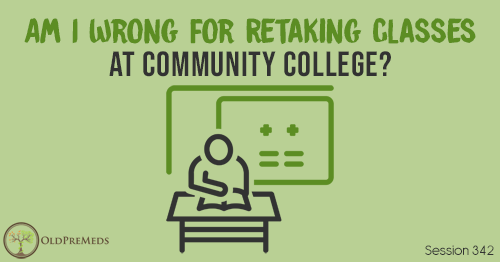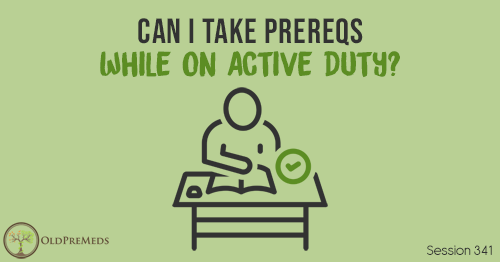Apple Podcast | Google Podcast
Session 268
This premed returned to school after a decade and is doing great, but their old grades are holding them back with a 1.9 science GPA. Can this premed turn the tide?
Questions answered here on the podcast are taken directly from the Nontrad Premed Forum over at premedforums.com. Please go ahead and register for an account, ask your question, and have fun with the community.
If you’re enjoying this Q&A format, please check out Mappd, which houses the Ask the Dean podcast, which I co-host with Mappd colleagues Dr. Scott Wright and Rachel Grubbs. Also, please be sure to check out all our other podcasts on Meded Media as we try to bring you as many resources as you need on this journey.
Listen to this podcast episode with the player above, or keep reading for the highlights and takeaway points.
A common question we get from students is when to schedule their MCAT test and whether taking it in June or July is still okay.
[01:45] The MCAT Minute
A common question we get from students is when to schedule their MCAT test and whether taking it in June or July is still okay.
The short answer is yes. But you need to make sure you’re dedicating enough time to your application, as well as your MCAT prep so you can still turn in your application early enough.
'Delaying your application until you get your MCAT score back is going to hurt your application timing.'Click To TweetRemember, rolling admission is a thing among medical schools. So if you need to take the test in June or July because that’s when you’re going to be most prepared, go right ahead and do that. But make sure you’re trying to get your application in before that.
The MCAT Minute is sponsored by Blueprint MCAT. Check out their awesome study planner which you will get once you sign up for a free account. Also get access to their half-length diagnostic, full-length one, and their amazing study planner tool. Let it know how much you’re planning on studying and it will generate a custom study plan for you which you can adjust as needed.
[03:06] OldPreMeds Question of the Week
“Hey! I’ve been trying to live by the Old Premed mottos. I put blinders on and run my own race. I keep moving forward no matter what. No plan B! My question is do you ever get to a point when enough is enough?
After over a decade, I finally went back to college. I’ve gotten 13 A’s out of 16 classes over the past 4 semesters. If I keep doing as well as I have been, as calculated by my school, I could graduate with a 3.8 GPA.
However, when my grades are calculated on Mappd, due to some retakes, my cumulative GPA is under 2.28 and my science GPA is 1.99. I only need 34 credits to graduate, but the projection calculator says I need 130 credits to reach a 3.0. I don’t know if a postbac will even help at this point. My original plan was to get an MS, but I’m hearing a lot of reasons that won’t work.
Here’s the damage:
When I was a teenager, I started off well with a semester on the Dean’s list. After some family and financial issues, I had a few semesters where I either withdrew from all of my classes or it was too late so I failed them all.
I tried to go back to school a few years later, but was unable to manage it because I had to work several jobs to stay afloat. I’m finally in a position where I have a good job that allows me to work from home and stability enough to focus on school. I’m afraid that it’s far too late. The damage is done and maybe irrevocable.
Any advice is greatly appreciated. Thank you!”
[04:59] When is Enough Enough?
You have shown that you are academically capable right now of doing well in medical school.
'Your trends matter a great deal, especially when you have a low GPA.'Click To TweetIt sounds like this student is still in their bachelor’s program waiting to finish their first bachelor’s degree. And when you graduate with a very low GPA, you can continue to take some more classes so you can have a postbac or a graduate GPA. Because your low GPA is a potential reason to be filtered out by the medical schools, so you don’t want that.
Every medical school can do something differently. They don’t just see the table that you see when you print out your AMCAS application. To help you get a better idea, watch the Application Renovation videos where we break down applications and you’ll see what that table looks like.
Basically, it’s a PDF that AMCAS gives students of what their GPA looks like. And medical schools get every single data point and they can sort, filter, and analyze that data however they may want.
[07:55] How Medical Schools Look at You
And so, a student who really struggled early on, but is doing great will have the opportunity from some schools to be looked at like everyone else. Some schools look at your last 20 hours of science, others look at your last 16 hours total and some look at your last 32 hours total. Every school is different.
What you should do is reach out to some of the schools you’re interested in and see if they will give you any feedback on how they will look at the data presented in your application.
With that said, you have put in the hard work and you’re doing great so continue to do that.
[08:52] Identifying the Reasons You’re Struggling
Ultimately, you know enough is enough when you realize you don’t want to be a physician anymore. and secondly, when you realize you don’t have the academic ability to do well in medical school.
So for this student, if you have a 2.28 GPA, and you continue to get C’s and B minuses or D’s that is showing that you are not academically capable of doing well in medical school. And so, enough may be enough.
However, there are lots of reasons why you may be struggling. Number one, you just don’t have enough time to dedicate to school. If that’s the case, stop going to school and digging a deeper hole.
Another reason is maybe you have some sort of learning disability that you don’t know about yet that hasn’t been diagnosed about yet. Then your study habits and how you sit down and learn have to be adjusted appropriately to the way that you need to learn.
Number three, you’re just not that smart. But what that means is you’re not putting your full effort into the classes that you need to be putting your full effort into. And there are a lot of reasons for this. Maybe you’re not interested in the topic and you don’t really want to be a doctor. So this stuff just comes really hard to you. And so, no matter how many tutors you have, or different learning styles that you use, you just can’t grasp it.
'Struggling in specific coursework doesn't necessarily mean you're going to be a bad physician. It just means that you may potentially struggle in medical school.'Click To Tweet[11:05] Why Schools Don’t Like to See You Struggle
Remember, schools don’t want to see that you’re struggling in medical school and in your boards for two reasons. First, they don’t want to put you through all of that schooling and all of that debt for you to come out on the other end and not be able to pass your boards.
Secondly, it looks bad for the school. The schools don’t want to report that you didn’t finish medical school that you dropped out or you were kicked out. That looks bad on the medical school and it’s a bad reflection on them. So you have to show academic capability at some point. Ultimately, when to pull the plug all depends on you to determine that.












